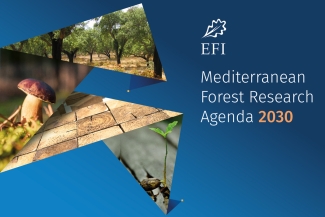New agenda focuses on Mediterranean forest resilience in the face of climate change

The Mediterranean forest research community has a new mandate for action to strengthen the resilience of Mediterranean forest ecosystems over the next ten years.
In an extraordinarily challenging decade, we are seeing accelerating climate, ecological, socioeconomic and political changes transforming the complex socio-ecological systems of the Mediterranean, while pressing environmental challenges demand urgent attention from local and regional political agendas.
In response, the European Forest Institute Mediterranean Facility (EFIMED) has channelled the efforts of the Mediterranean forest community into establishing just where timely research focus could make the biggest impact in supporting Mediterranean forests to face up to these challenges. In a participatory process lasting more than two years, experts and stakeholders from around the Mediterranean network considered the challenges and the possible opportunities where forest research might make a difference.
The result is the Mediterranean Forest Research Agenda 2030 (MFRA 2030), a strategic document defining four priority areas for the research community to tackle in the immediate and medium term:
- Forest resilience in a context of global change related forest disturbances
- Conservation and management of biodiversity and forest genetic resources
- Forest management addressing trade-offs and synergies between multiple ecosystem services
- Social and business innovations and policy instruments supporting the Mediterranean forest-based bioeconomy.
MFRA 2030 is an update to the first Mediterranean Research Agenda (2010-2020), the progress of which was analysed as starting point for the 2030 edition. MFRA 2030 was launched at the end of 2022 at the inaugural EFI Mediterranean Network Forum and is available in English, French and Spanish.
EFIMED’s Principal Scientist, Magda Bou Dagher Kharrat, who coordinated the publication, commented that “we expect the MFRA 2030 to spur researchers and practitioners into action, while providing a reference for policymakers and funding agencies to support global efforts to strengthen Mediterranean forests’ resilience in the face of climate and biodiversity crises, and societal and demographic challenges”.
It is fundamental that Mediterranean forest stakeholders now take the messages from MFRA 2030 into consideration when planning new projects, collaborations, and interventions. Indeed, if Mediterranean-like conditions expand to large parts of adjacent areas, as predicted by climate scientists, the MFRA 2030 will become relevant for an even wider community of stakeholders.
Download the Mediterranean Forest Research Agenda 2030!
Available in English, French and Spanish.


